- Home
- Chris Wraight
The Sigillite
The Sigillite Read online
Book 1 – HORUS RISING
Book 2 – FALSE GODS
Book 3 – GALAXY IN FLAMES
Book 4 – THE FLIGHT OF THE EISENSTEIN
Book 5 – FULGRIM
Book 6 – DESCENT OF ANGELS
Book 7 – LEGION
Book 8 – BATTLE FOR THE ABYSS
Book 9 – MECHANICUM
Book 10 – TALES OF HERESY
Book 11 – FALLEN ANGELS
Book 12 – A THOUSAND SONS
Book 13 – NEMESIS
Book 14 – THE FIRST HERETIC
Book 15 – PROSPERO BURNS
Book 16 – AGE OF DARKNESS
Book 17 – THE OUTCAST DEAD
Book 18 – DELIVERANCE LOST
Book 19 – KNOW NO FEAR
Book 20 – THE PRIMARCHS
Book 21 – FEAR TO TREAD
Book 22 – SHADOWS OF TREACHERY
Book 23 – ANGEL EXTERMINATUS
Book 24 – BETRAYER
Book 25 – MARK OF CALTH
Book 26 – VULKAN LIVES
Book 27 – THE UNREMEMBERED EMPIRE
Book 28 – SCARS
Book 29 – VENGEFUL SPIRIT
Book 30 – THE DAMNATION OF PYTHOS
Book 31 – LEGACIES OF BETRAYAL
Book 32 – DEATHFIRE
Book 33 – WAR WITHOUT END
Book 34 – PHAROS
TALLARN: IRONCLAD
THE HONOURED
THE UNBURDENED
PROMETHEAN SUN
AURELIAN
BROTHERHOOD OF THE STORM
CORAX: SOULFORGE
SCORCHED EARTH
TALLARN: EXECUTIONER
THE CRIMSON FIST
PRINCE OF CROWS
THE PURGE
RAVENLORD
CYBERNETICA
WOLF KING
GARRO: VOW OF FAITH
Many of these titles are also available as abridged and unabridged audiobooks. Order the full range of Horus Heresy novels and audiobooks from blacklibrary.com
It is a time of legend.
The galaxy is in flames. The Emperor’s glorious vision for humanity is in ruins. His favoured son, Horus, has turned from his father’s light and embraced Chaos.
His armies, the mighty and redoubtable Space Marines, are locked in a brutal civil war. Once, these ultimate warriors fought side by side as brothers, protecting the galaxy and bringing mankind back into the Emperor’s light. Now they are divided.
Some remain loyal to the Emperor, whilst others have sided with the Warmaster. Pre-eminent amongst them, the leaders of their thousands-strong Legions are the primarchs. Magnificent, superhuman beings, they are the crowning achievement of the Emperor’s genetic science. Thrust into battle against one another, victory is uncertain for either side.
Worlds are burning. At Isstvan V, Horus dealt a vicious blow and three loyal Legions were all but destroyed. War was begun, a conflict that will engulf all mankind in fire. Treachery and betrayal have usurped honour and nobility. Assassins lurk in every shadow. Armies are gathering. All must choose a side or die.
Horus musters his armada, Terra itself the object of his wrath. Seated upon the Golden Throne, the Emperor waits for his wayward son to return. But his true enemy is Chaos, a primordial force that seeks to enslave mankind to its capricious whims.
The screams of the innocent, the pleas of the righteous resound to the cruel laughter of Dark Gods. Suffering and damnation await all should the Emperor fail and the war be lost.
The age of knowledge and enlightenment has ended.
The Age of Darkness has begun.
Khalid Hassan sat in the antechamber, trying not to sweat, trying not to allow his hands to shake, trying to not do anything that would bring any more dishonour to his rank and regiment. He forced himself to remain still, his back against the polished marble wall. His palms pressed down onto the fabric of his ceremonial dress trousers. The high, stiff collar prickled at his neck, irritating his freshly shaved skin.
He felt ludicrous – cleaned and trimmed and starched, like a living meal to be served in some unholy banquet.
He drew in deep, regular breaths.
‘This is absurd,’ he muttered. ‘I was not wound this tight on the mission itself.’
He forced himself to go through the motions, to assess the current scenario, to run through the options.
‘Keep it together.’
The antechamber was large, just one of a series of opulent rooms he’d passed through in sequence. He had been accompanied inside by a man in a black shift and velvet shoes who had padded silently like a cat. The man had said nothing, just stared at Hassan with inscrutable, heavy-lidded eyes. He’d left him alone in the final room with a slight bow, withdrawing as sleekly as he’d arrived, closing two bronze-panelled doors with a quiet click of locks. Another pair of identical doors stood shut on the facing wall.
According to the gold-chased chrono on the mantelpiece opposite, Hassan had sat alone for seven minutes. It had felt more like an eternity.
At least the surroundings were comfortable. The air was cool and clear, filtered through shuttered windows. Hassan could hear the languid gurgle of a fountain in the courtyard outside. A low table stood in the centre, upon which rested a silver ewer, a towel and a single cut crystal glass that glinted in the soft light.
Hassan had not touched it. He had sat in the same starched position since being shown to his place by the feline steward. He had watched the play of sunlight through the shutters, smelled the floral aroma of the wood and the fabrics, listened to the quiet play of the fountain.
He had seen it. Even if this was the last thing he saw, he had still seen it. How many men could say the same?
He had seen the vision of the immortal Emperor, the handiwork of a thousand architects, the defensive masterpiece of the primarch Rogal Dorn. Viewed from the incoming lander it had been astonishing, magnificent – a sprawling fantasy of stone, adamantium, granite and gold. Defence towers jostled with observatories and terraced gardens; missile batteries and slotted bunkers thrust up tightly amid pillared libraries; burnished monuments to the pride and ambition of mankind, all picked out under the azure sky of the Himalazian peaks.
Now, lost in the heart of its vastness, listening to the calming trickle of water, he could run through the events of the past few days.
Captain Khalid Hassan of the Fourth Clandestine Orta, the most decorated of the serving officers of his regiment, a man who had loved his work so completely that he had had no life and no family outside of it, contemplated, with a certain fatality, the failure that had brought him to the Imperial Palace.
The air was hot and thick with dust. His armour – black carapace plates, full-face helm with opaque visor and rebreather tubes, environment spine-pack with internal pressure control – was coated with it. His filters were losing efficiency, and he could hear the echo of his own heavy breathing in his earpiece.
Ahead of him, blurry through night vision, he could see the compound rearing up into the dust-thick darkness. It was ugly, squat, heavy – a defensible bastion in the Gyptian style. A few lights blinked and flickered in the gloom; otherwise, it was shadowy and sullen, surrounded by a solid perimeter wall broad enough for men to walk upon it in pairs.
Hassan lay low, feeling the hardscrabble of the desert fringes press into his armour. He rested his elbows on the ridge before him. Tiny magnocular lenses slipped down the inside curve of his helm visor and whirred into focus. He moved his head fractionally, sweeping across the walls. Each visible detail was recorded and
cross-referenced with the internal schematic held in his suit’s cogitator core.
Las-turret, two metres out of position. Corrected. Sentries visible, moving along perimeter boundary. They haven’t seen us.
He suppressed a smile.
And they won’t.
He heard Farouk squirm up alongside him, his body low and pressed into the dust.
‘Just say the word, captain,’ said Farouk.
‘Everyone in position?’ asked Hassan, completing the sweep.
‘All ready to go.’
Hassan uploaded the revised tactical overlays to the squad. Fifteen acknowledgement sigils scrolled down his helm display. He switched to an overhead schematic showing the positions of his men – they were located around the perimeter in five-man squads, each still in cover. Two of the three teams were on the far side of the compound from Hassan’s position, poised to attack the air defence tower and the atmospheric shield generators. Their sensor-resistant armour would keep all of them hidden. Until they broke inside, they would be all but invisible.
‘So what are we doing here, captain?’ asked Farouk.
Hassan smiled dryly. ‘Now? You ask me now?’
‘You’re not going to tell me.’
Hassan shook his head. ‘You know how it is.’
All of them knew how it was. That was the point of the Clandestine brigades: restricted orders, special taskings, operations outside the Imperial chain of command. Farouk chafed at it the most, but then he’d come from a regular Army regiment and was used to a less furtive way of war.
As for this mission, Hassan knew little enough himself. The orders had been shunted into the regiment core six days ago under heavy security cover. His men had re-routed from a routine sweep of the Collovis Hives. Ever since the insurrection had begun, subversive activity had been endemic in the bigger population hubs. Hassan had even heard chatter over the grid about rogue legionaries staging a prison break. He didn’t believe that one. There were always fanciful stories about those armour-clad superhumans; more, since the news of the Warmaster’s madness had filtered out.
In any case, Hassan didn’t place much faith in the Space Marines. They had a reputation, sure, but he doubted half of what was said about them could be true. The Imperium had been built by mortal men and woman, billions upon billions of them, toiling towards a future free from the horrors of Old Night. Genhanced monsters had no place there – they were brutal, clumsy tools and their time would pass.
Which left the way clear for more subtle weapons.
He checked his chronometer.
‘Move,’ he ordered across the vox.
Still out of visual range, all he saw of the two other teams were their marker runes moving silently across his visor display.
Farouk stayed motionless. Behind him, the rest of his own squad remained in cover.
Hassan felt his pulse quicken as he counted down the seconds.
‘Let’s go.’
He pushed himself up, keeping his body low as he jogged out into the open. He heard the soft footfalls of his men close behind him. They broke clear of the ridge and swept across the open ground leading to the walls.
As they ran, the earth was suddenly rocked by a series of hard, sharp explosions from the far side of the compound. The night sky flared up, red and angry. Arc-lights burst into life, joined by the strained blare of intruder alarms.
The sentries on the wall ahead of them disappeared from the parapet edges, drawn by the detonations at the opposite edge of the facility.
Hassan reached the base of the wall and prepared the grapnels.
‘Too easy,’ said Farouk, joining him and taking aim.
‘So far,’ agreed Hassan, squinting as he pulled the trigger. The rope sailed up, clamping fast and pulling tight, and he began to climb.
Soon all five of them had reached the summit and they swung over the lip of the parapet. They took up their weapons – projectile rifles, as sleek, black and finely tooled as everything they carried. By the time the sentries spotted them it was too late – precise kill-shots flashed in the night.
More explosions rang out from the compound below. A shower of yellow sparks erupted in the distance, making the air smell briefly sulphurous.
‘First generator’s out,’ remarked Farouk.
Hassan grunted. Farouk was a good soldier, but his tactical commentaries quickly grew tiresome. ‘Let’s just concentrate on our tasking, shall we?’ he said.
‘Whatever you say.’
The expanse of the compound spread out below – a loose collection of hangars and rockcrete bunkers, all of which were ugly, dark and scoured by wind-driven sand. Fires had broken out amongst those on the far edge, sparked by the incendiaries planted by the two other teams. Hassan could see the silhouettes of guards crossing the open spaces, their movements hurried and ill-directed. They were still trying to reinforce the northern wall, over where the evidence of infiltration had been made most obvious.
So far, so good.
‘That’s the target,’ said Hassan, moving along the parapet and gesturing to one of the bunkers below. It was a nondescript building, just one of a dozen that were of a similar size and shape.
‘Ugly thing,’ observed Farouk.
‘It’ll be uglier in a minute,’ said Hassan. ‘Keep it quiet.’
One by one they rappelled to the ground. They kept low, running semi-hunched. Three more guards fell before they reached their destination, dropped by single rounds. When they reached the shelter of the bunker entrance they crouched down, as inconspicuous as shadows.
The bunker’s blast doors were sealed and barred. Hassan clamped six hyperacid capsules along the join, then retreated and blew the charges. The thick metal doors dissolved in a steaming, foaming cloud. Hassan heard a cluster of short-lived screams as the guards on the other side inhaled the toxic mix of dissolving plasteel and airborne chem-droplets – otherwise, the breach was almost silent, masked by the continuing explosions and gunfire running along the northern wall.
All that remained afterwards was a steaming, jagged void, its steel edges melted into stretched teardrops.
Hassan got to his feet. The bunker interior beckoned, ink-black and smelling of molten flesh and metal.
‘Now we enter,’ he said, and slipped inside.
‘Now you enter,’ came the voice, as soft and sibilant as he’d imagined it would be.
Hassan stirred out of his memories. He couldn’t see the speaker. He guessed it was the same man who’d shown him into the antechamber.
He looked up, seeing that the second set of doors had opened. He hadn’t noticed them unlock; the mechanism must have been extraordinarily smooth.
He rose awkwardly. He could feel patches of sweat under his arms and around his collar, and hoped they didn’t show. His limbs felt stiff, as though he’d forgotten how to walk and needed reminding.
Once through the doors, he passed into a vast sunlit chamber. One entire wall was given over to a long unbroken expanse of glass. Circling mountains broke up the horizon beyond, glittering white in the sunlight.
The floor was polished parquet. Eclectic items of furniture dotted the cavernous interior – a Louis Canz armoire stood next to a Unity-era ’lith projector, overlooked by a series of Hjuort oils and a cabinet containing priceless Ming and Wejwood ceramics.
It reminded him of a magpie’s nest. A collector’s den. Ostentatious, given the circumstances.
Hassan was alone. The room was silent. The doors closed behind him, moving together as quietly and elegantly as they had opened.
For a moment he stood still, listening to the sound of his own breathing, wondering if the things he saw around him were even real. Perhaps this was a test. Perhaps he was being shown one final glimpse of glory before the end.
Hassan knew they could have pronounced their judgement at any time. H
e had already given them all the information he could. He had been most careful about it, making sure the details were correct. Even in his failure he had not stinted nor tried to excuse himself. That had always been his way: honesty, even in disgrace. Such, of course, were the values of the Imperium, the basis upon which his loyalty had always been commanded.
Time passed. No one else entered the room. Hassan began to lose his sense of slow foreboding. He walked over to the windows, standing close to the glass and resting his fingertips against it.
The vista spread out before him – a dizzying sweep across the Palace’s western marches.
So much gold. So much of everything.
Vertiginous battlements plunged like cataracts into thickets of bone-thin towers. Colossal buttresses soared up from the bones of the mountains, massive and eternal. Even Lord Dorn’s heavy alterations along the outer walls hadn’t obliterated all of the Palace’s old and innate beauty.
Gazing over such vastness, it was hard not to feel strangely insignificant. The walls had already stood for centuries. They would endure for centuries more – a beacon of splendour amidst an expanding empire of mortal exaltation.
‘I liked it better before Rogal really got to work.’
The voice came out of nowhere. Hassan spun around, scanning across the chamber.
He was still alone. The voice seemed to rise from the air around him, echoing from the panels and sinking into the fabric of the woven rugs.
It was a strange voice. Mournful in tone, rich in timbre, cracked by age.
‘I do not see you, lord,’ replied Hassan, feeling stiff and stupid.
‘No, not yet. I cannot be in all places at once. We may save some time this way. Does it unsettle you?’
Of course it did.
‘Not at all.’
‘Good. Then keep looking at the view. Remember it. With every passing day it will get a little uglier, a little more worn. Just like us, eh?’
Hassan turned back to the window. He wondered whether the speaker could see him. He assumed that he could, though one could never be sure. Throwing a voice was trivially easy. Such theatrics, as he well knew, were all part of the process.
‘You are not a man given to levity,’ came the voice again. ‘That is what the reports all say – serious-minded, diligent. I can sense that in you myself. You are the embodiment of everything the Emperor aspires to instil in humanity. He would admire you, I think, were He here with us.’

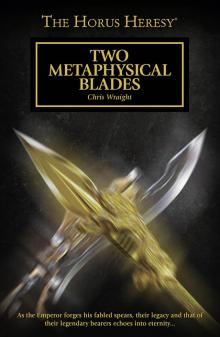 Two Metaphysical Blades
Two Metaphysical Blades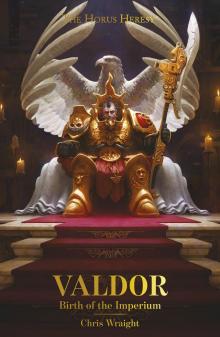 Valdor: Birth of the Imperium
Valdor: Birth of the Imperium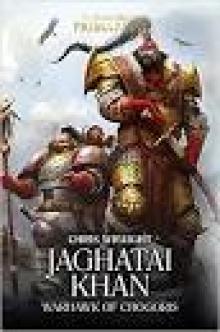 JAGHATAI KHAN WARHAWK OF CHOGORIS
JAGHATAI KHAN WARHAWK OF CHOGORIS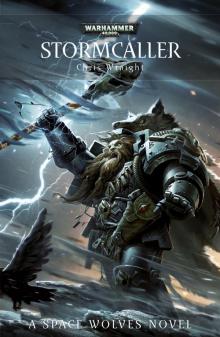 Stormcaller
Stormcaller Child of Chaos
Child of Chaos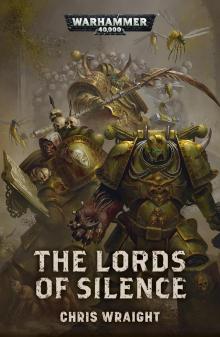 The Lords of Silence
The Lords of Silence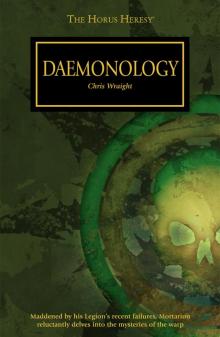 Daemonology
Daemonology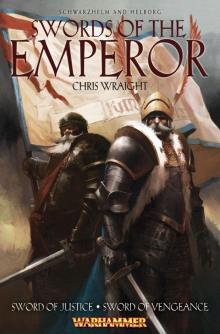 Swords of the Emperor
Swords of the Emperor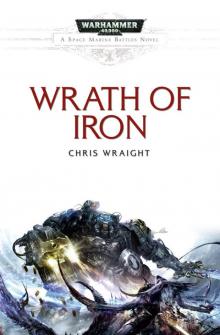 Wrath of Iron
Wrath of Iron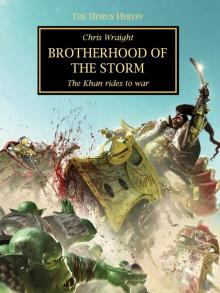 Brothers of the Storm
Brothers of the Storm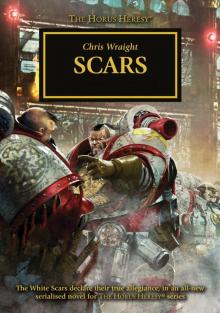 Horus Heresy: Scars
Horus Heresy: Scars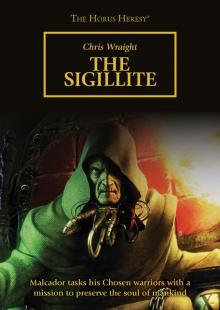 The Sigillite
The Sigillite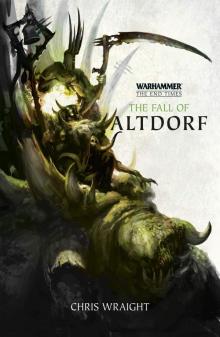 The End Times | The Fall of Altdorf
The End Times | The Fall of Altdorf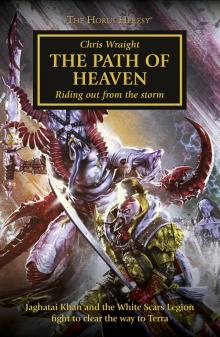 The Path of Heaven
The Path of Heaven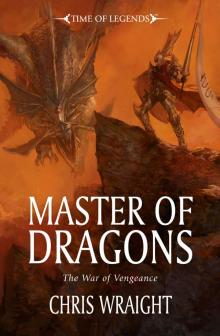 Master of Dragons
Master of Dragons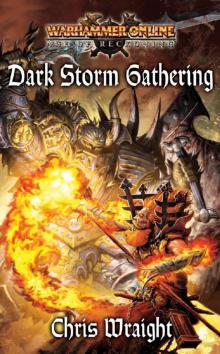 WH-Warhammer Online-Age of Reckoning 02(R)-Dark Storm Gathering
WH-Warhammer Online-Age of Reckoning 02(R)-Dark Storm Gathering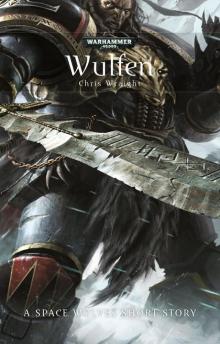 Wulfen
Wulfen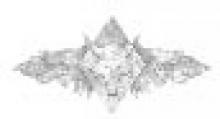 Battle Of The Fang
Battle Of The Fang Onyx
Onyx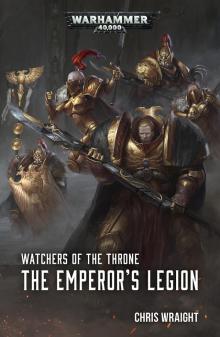 Watchers of the Throne: The Emperor’s Legion
Watchers of the Throne: The Emperor’s Legion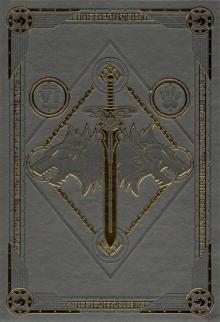 Leman Russ: The Great Wolf
Leman Russ: The Great Wolf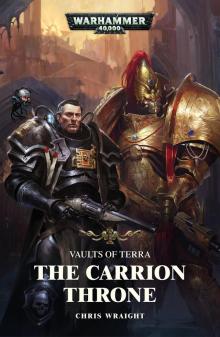 Vaults of Terra: The Carrion Throne
Vaults of Terra: The Carrion Throne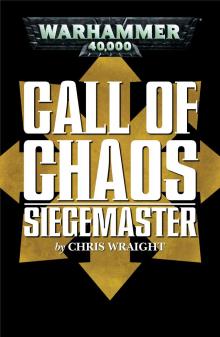 Siegemaster
Siegemaster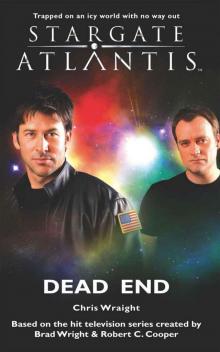 STARGATE ATLANTIS: Dead End
STARGATE ATLANTIS: Dead End Scars
Scars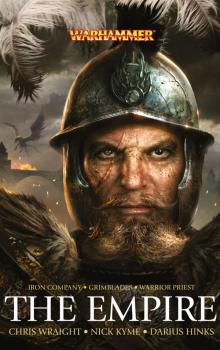 The Empire Omnibus
The Empire Omnibus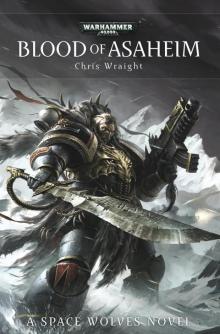 Blood of Asaheim
Blood of Asaheim